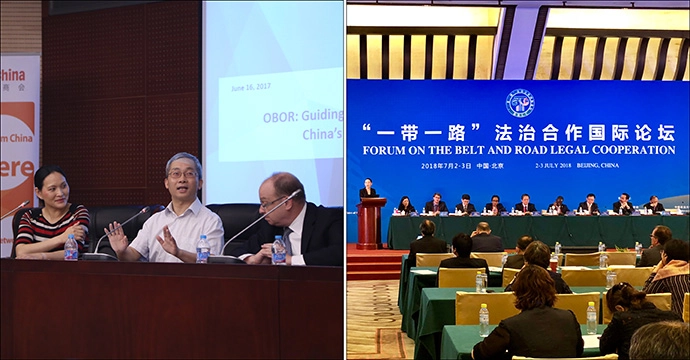Arbitration and China’s Global Business

Image: Linnaea Mallette, Shipping Port (Publicdomainpictures.net)
The growing importance of global business to China makes it crucial for the country to show its commitment to recognize and enforce foreign arbitral awards. Since 1987, China has been a contracting state of the New York Convention, which requires each contracting state to ensure that its judiciary recognizes and enforces an arbitral award made in another contracting state, unless such recognition or enforcement would be contrary to the contracting state’s “public policy”, among other exceptions. The convention does not interpret the “public policy” exception. How the Chinese judiciary interprets it directly influences foreign parties’ level of confidence in doing business with China. A recent court case in China sheds light on the interpretation of this exception.
Technology, Food, Health Care, & Foreign Relations; and More

Images: Jennifer Olschefski, Fractal Tech Disc Background;
Circe Denyer, IV Needle;
icon0 com, Green Rice Farm;
Mohamed Mahmoud Hassan, Chatting And Using Emoji (Publicdomainpictures.net)
SinoExpress™, a monthly newsletter of SINOTALKS®, has nearly 1,100 subscribers. This issue covers tech investments in China, rice production in Africa, health care in the Soloman Islands, and the use of emojis.
The Global Legal Services Market

Image: Kai Stachowiak, Background Wallpaper (Publicdomainpictures.net)
The global legal services market has been predicted to grow to USD 1,311.63 billion by 2031, with the fastest-growing regions being South America, the Middle East, Africa, and Eastern Europe and it is estimated that their compound annual growth rates will range from 11.1% to 8.9%. What are the implications of these predictions for lawyers and rule-of-law developments in China?
Guiding Case No. 196: Top Court’s Liberal Approach to Arbitration

Image: Petr Kratochvil, Science And Technology (Publicdomainpictures.net)
Guiding Case No. 196 (“GC196”) holds that, under Chinese law, an agreement to arbitrate is independently enforceable, even if the agreement was intended to be part of a larger contract that never fully formed. Through a comparison of GC196 with U.S. law, Tyler Atkinson explains why GC196 shows that Chinese law is arguably more favorable to arbitration than the law of the United States, a jurisdiction that, itself, strongly favors arbitration. He also shares practical insights about what companies affected by GC196 should do to avoid the risk of being forced into arbitration.
From AI to Arbitration

Images: Peter Griffin, Bullet Train;
Victoria Borodinova, Bedouin, Desert, Caravan, Camels (Publicdomainpictures.net)
Long before the emergence of AI chatbots, China had already prioritized the development of AI, resulting in the promulgation of pioneering legislation to boost foreign investment. Applying similar long-term planning skills, China began years ago to revive the glory of Xi’an, the eastern terminus of the ancient Silk Road, by enhancing the city’s capacity to resolve legal disputes arising from China’s current Belt and Road Initiative. Xi’an’s recent hosting of the China–Central Asia Summit has signaled the city’s potential to facilitate again the economic development in this region. These achievements are quite remarkable. How did China get here and where will this likely lead to?
Guiding Case No. 196

Image: Mohamed Mahmoud Hassan, Contract Signature (Publicdomainpictures.net)
In December 2022, the Supreme People’s Court of China released Guiding Case No. 196 to provide significant guiding principles regarding the validity of an arbitration clause even though the contract that contains the clause has not been formed. These principles will have a considerable impact on legal practice.
China’s Booming Cross-Border E-Commerce &
Online Dispute Resolution

Image: chaythawin (Shutterstock.com)
Despite various economic challenges facing China, the country’s cross-border e-commerce stands out to show rapid growth. The seeds of this growth were, however, not planted erratically as a response to economic woes associated with the COVID-19 pandemic. Understanding how this type of commerce has gained governmental support and what latest measures have been taken to resolve related disputes helps businesses seeking to sell globally seize potentially lucrative opportunities.
China’s Economic Recovery and International Commercial Arbitration

Image: sabthai (Shutterstock.com)
China’s release of a Typical Case showcasing how courts in Shanghai recognized and enforced a foreign arbitral award by a special reading of the factual situation involved may help instill more confidence in foreign parties amid China’s efforts to revive its economy. How was this breakthrough ruling made? What are the implications of the ruling?
China’s Belt and Road Initiative & Legal Reform

This piece describes how the release of Typical Cases related to China’s Belt and Road Initiative in 2015 ultimately led Dr. Mei Gechlik to make a suggestion at a 2018 international forum organized by the Chinese government […].
Guiding Case No. 109

Image: Kevin Casper, San Jose Costa Rica (Publicdomainpictures.net)
In February 2019, the Supreme People’s Court of China released Guiding Case No. 109 and five other Guiding Cases to illustrate how Chinese courts handled issues related to the country’s Belt and Road Initiative. Guiding Case No. 109 specifically shows the Supreme People’s Court’s firm adherence to legal rules and principles that protect the value of the “payment on demand” system of independent guarantees.
